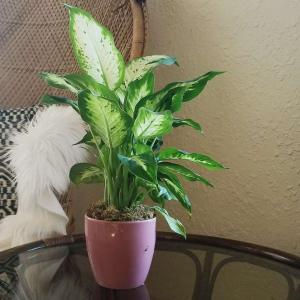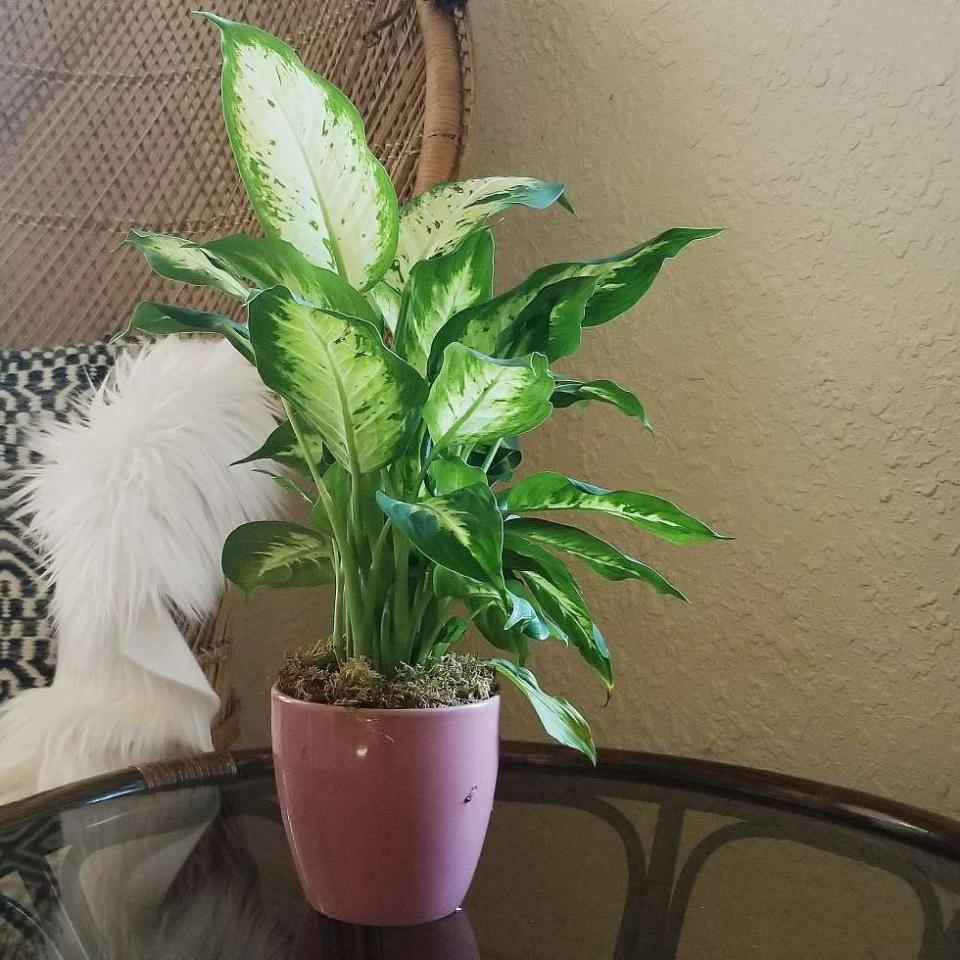植物经验
详细说明
LIGHT
Dieffenbachia Houseplants require medium to high light. Direct sun burns the leaves and too much bright light causes the vibrant leaf color to fade. When an indoor Dieffenbachia Plant does not get enough light, the new leaves are small and far apart on the stem.
WATER
Water Dieffenbachia Houseplants well and then allow the top 2"-3" of soil to dry out before watering again. These plants do best when watered on a regular schedule.
FERTILIZER
Fertilize your Dieffenbachia only when the plant is actively producing new leaves. Most Dieffenbachia houseplants should be fed every two weeks in the summer and once a month in the spring and fall. Never feed a Dieffenbachia in the winter. Excess plant food causes browning around the edges of the leaves.
TEMPERATURE
Dieffenbachia Plants prefer temperatures above 60 degrees. The lower leaves on a Dieffenbachia turn yellow when exposed to cold drafts from doors, windows, or air conditioners.
HUMIDITY
A Dieffenbachia Plant prefers high humidity but still does well in basic household humidity.
FLOWERING
Dieffenbachia Houseplants develop rather non-descript spath-like flowers. I recommend cutting Dieffenbachia Plant flowers off as soon as they appear since they slow leaf development.
PESTS
The main plant pests to look out for on Dieffenbachia houseplants are spider mites and Mealy Bugs.
DISEASES
Humidity loving Dieffenbachia Plants are subject to BacterialLeaf Spot Disease, Erwinia Blight, and other bacterial diseases.
SOIL
The best soil for Dieffenbachia houseplants is a rich organic mixture that drains quickly.
POT SIZE
A Dieffenbachia likes to be a little pot-bound. Repot your plant in the spring if the roots have filled the existing pot. The new container should only be about an inch or two wider than the old container.
PRUNING
Aggressively prune your Dieffenbachia to keep the plants bushy and prevent them from getting top heavy.
PROPAGATION
Propagate Dieffenbachia houseplants using air layering and stem cuttings
Dieffenbachia Houseplants require medium to high light. Direct sun burns the leaves and too much bright light causes the vibrant leaf color to fade. When an indoor Dieffenbachia Plant does not get enough light, the new leaves are small and far apart on the stem.
WATER
Water Dieffenbachia Houseplants well and then allow the top 2"-3" of soil to dry out before watering again. These plants do best when watered on a regular schedule.
FERTILIZER
Fertilize your Dieffenbachia only when the plant is actively producing new leaves. Most Dieffenbachia houseplants should be fed every two weeks in the summer and once a month in the spring and fall. Never feed a Dieffenbachia in the winter. Excess plant food causes browning around the edges of the leaves.
TEMPERATURE
Dieffenbachia Plants prefer temperatures above 60 degrees. The lower leaves on a Dieffenbachia turn yellow when exposed to cold drafts from doors, windows, or air conditioners.
HUMIDITY
A Dieffenbachia Plant prefers high humidity but still does well in basic household humidity.
FLOWERING
Dieffenbachia Houseplants develop rather non-descript spath-like flowers. I recommend cutting Dieffenbachia Plant flowers off as soon as they appear since they slow leaf development.
PESTS
The main plant pests to look out for on Dieffenbachia houseplants are spider mites and Mealy Bugs.
DISEASES
Humidity loving Dieffenbachia Plants are subject to BacterialLeaf Spot Disease, Erwinia Blight, and other bacterial diseases.
SOIL
The best soil for Dieffenbachia houseplants is a rich organic mixture that drains quickly.
POT SIZE
A Dieffenbachia likes to be a little pot-bound. Repot your plant in the spring if the roots have filled the existing pot. The new container should only be about an inch or two wider than the old container.
PRUNING
Aggressively prune your Dieffenbachia to keep the plants bushy and prevent them from getting top heavy.
PROPAGATION
Propagate Dieffenbachia houseplants using air layering and stem cuttings
花相册 (1)

brielle
2017年09月10日

I received this as a birthday gift from my parents on 9/10/17.







